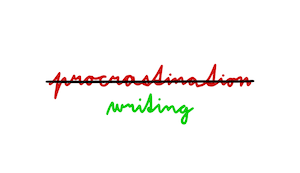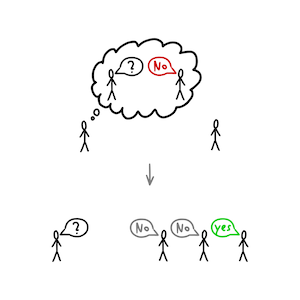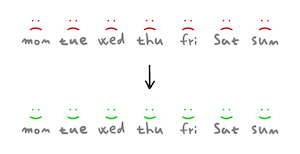Why do I always start so late

Do you always postpone tasks until the last possible moment?
Then, right before the deadline, you have to hurry up and do everything, stressed out.
Why do we do that?
People often claim that it is because they work better under pressure. Well, that could be the case but as studies have shown, we don’t really work better under pressure.
In the majority of cases, we try to protect our self-image of being smart, great at what we do. Let us explain.
Procrastinators often believe:
Self-worth = ability = performance
Their self-worth is based on what they’re able to do. The proof of what they’re able to do is based on their performance.
Bad presentation = I’m worthless..
Bad painting = I’m no good at this.
Unanswered message = I’m not good enough.
This pressure can be so great that procrastinators choose to avoid making an effort altogether. Why? Because then they have an excuse.
When you wait close to the deadline, you break the equation. Your performance is not a reflection of your ability anymore, because you didn’t have time to truly perform.
Suddenly, all 3 possible outcomes are fine:
Your performance on the task is a success - your self-image is preserved and improved. Omg, look at me, I achieved this with so little time left. Only if I had all the time in the world, then the result would be even more spectacular.
The performance is average - your self-image is preserved. It’s okay but if I had more time, I would ace it.
The performance is a failure - your self-image is preserved. I simply didn’t have enough time to succeed. If I had the time, I’d definitely succeed. If only I’d started earlier...
So instead of showing our real abilities, we’re just testing how well we perform when we don't have enough time. This phenomenon is called self-handicapping and leaving yourself little time to complete a task is one of the most common examples of it. We’re protecting ourselves from testing our real abilities and then finding out that we’re still not good enough. It would ruin our view of our talent and intelligence.
How to start working early(ier)
If you want to finish tasks ahead of time and enjoy peace for once, first you need to break the equation:
Self-worth = ability = performance
1. Realize performance doesn’t reflect just our ability
Performance = ability is a simplistic view.
In reality, it looks more like this:
Performance = ability * motivation * energy * time * luck
So when you think about it, your performance doesn’t really prove or disprove your ability and self-worth.
Sometimes, you could be really skilled at a task (high ability) but because you’re super tired, your result isn’t worth much.
In collective sports, players often have high skill, a lot of energy, and motivation but because they aren’t lucky, they don’t score. The best athletes know that luck will come and go and they need to keep trying instead of feeling down after not getting lucky.
After you realize that performance is determined by many more variables, you stop being so scared of performing.
2. Believe your ability can always grow
Even if your ability is low and it’s the cause of your bad performance, it isn’t the end state. You can always change, learn, improve, and grow.
You probably don’t remember how difficult it was learning to walk. You tried at least a thousand times. Then slowly your feet and brain learned to coordinate together to hold a balance. Now, you don’t ever think about how simple it is to hold balance while standing on your feet.
You also don’t remember how much you struggled when you learned to read and write. Mat here: I remember I came home from school one day when I was learning to read in the first grade. We had homework to do to practice reading. It was more difficult than the elementary words (like mom and dad) and I really struggled. I started crying and threw away the textbook because I thought I could never do it and I would stay illiterate forever. Guess what, I was wrong that day.
“Life-long learning” became a buzzword but it’s really true. Everyone has the ability to learn, no matter how old we are, and we can usually do it faster than we think.
When you realize this, bad performance doesn’t have to mean that it’s the end of the world. Instead, it tells you that you have something to work on.
3. Your performance doesn’t have to be perfect
We often think that we should be getting to the best possible result there is. There are usually external pressures (like parents, friends, or bosses, marketing) that push us to be the best ever..
In reality, most things don’t really matter and they don’t need to be perfect. Often, good enough is sufficient.
The goal doesn’t necessarily have to be to get A’s, maybe the goal is to pass.
Maybe the goal isn’t to be in Instagram-worthy shape, but to be healthy and happy.
Maybe the goal isn’t to write a perfect report, it may be writing a simple report fast so that the right people are informed correctly and on time.
Not perfect, good enough.
When you understand this, a great weight lifts off your shoulders because you know you don’t need to be perfect.
4. Increase your self-esteem
Self-worth is directly connected to self-esteem.
When self-esteem is low and vulnerable, people tend to procrastinate way more. They’re even more dependent on their performance proving or disproving their self-worth.
Increasing self-esteem can become a catch-22 situation. You procrastinate because your self-esteem is low. However, you don’t want to start working because it might be proof that you’re bad and don’t deserve it. We cover this topic much more extensively in our guide - How to finally stop procrastinating, but here’s the short version:
Start stacking small wins.
Find something, anything, that you can do and do it. Look for tasks that you can successfully complete.
Every win will prove to yourself that you can change and improve. This trust in your abilities will translate into higher self-esteem.
When you have high enough self-esteem, you stop caring so much about any one performance. One bad attempt? No worries, I’ll do better next time.
Summary
To stop self-sabotaging and start working early:
- Realize that your performance doesn’t reflect your ability and self worth.
- Believe your abilities can always grow.
- Understand that your performance doesn’t have to be perfect.
- Increase your self-esteem by stacking small wins.
So, do you have a project that you’ve been putting off?
Start today, imperfectly.



